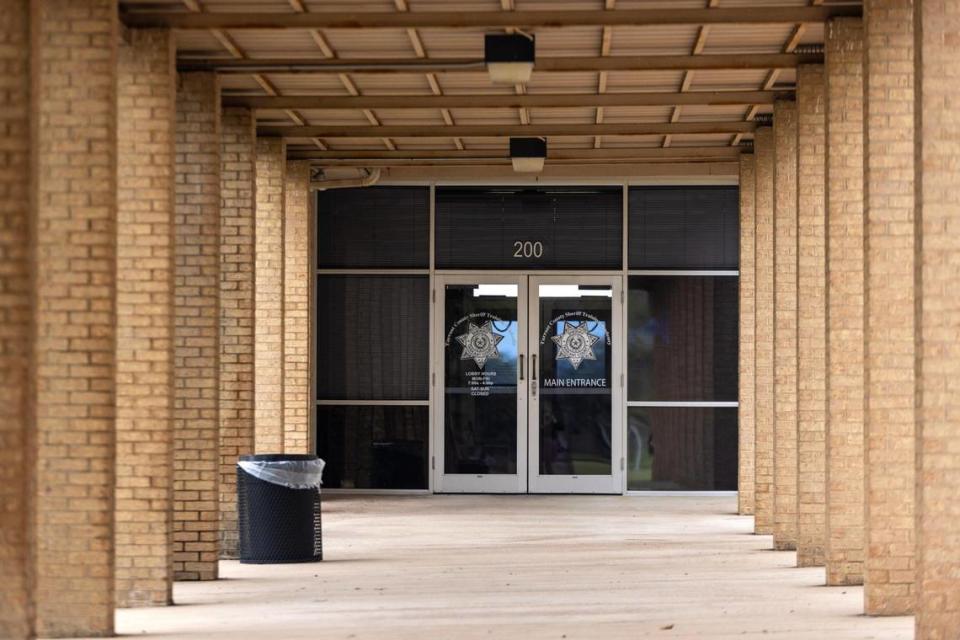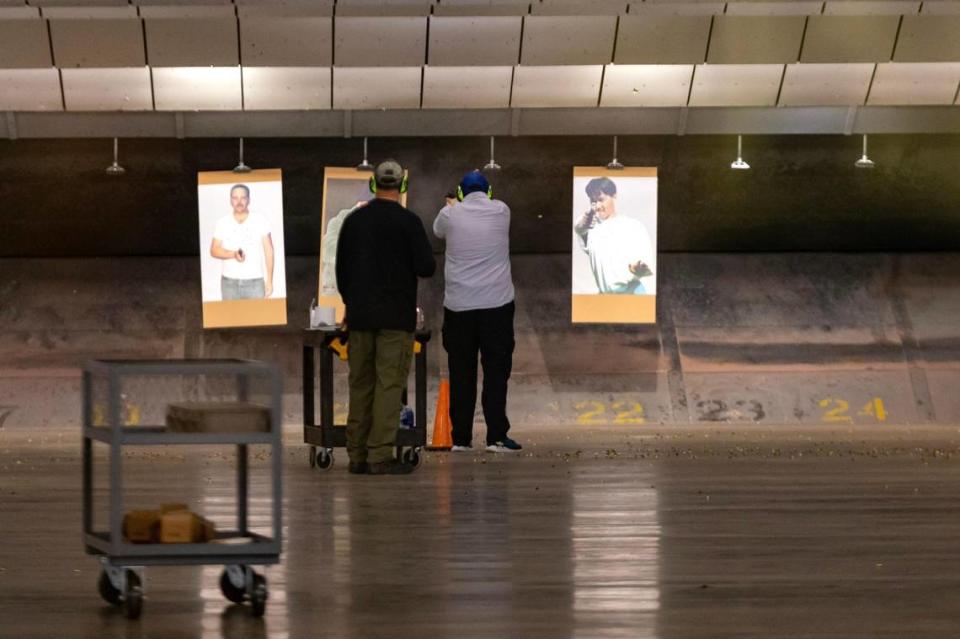Does the Fort Worth area need two regional law enforcement centers? Tarrant leaders think so
Tarrant County’s sheriff training academy is tightly packed.
Taser targets sit at the end of hallways. So do makeshift offices. One of those is next to the shooting simulator, a room without sound-proofing that can only be used in the evenings and on weekends due to the noise and disturbance it creates for others in the building.
Paint in one classroom that used to be living quarters is stripped off the wall, rubbed bare from bunk beds were in the room. And the HVAC system is so out of date that it’s almost helpless to fixing.
The building on Circle Drive in southeast Fort Worth dates to the 1970s. It used to be a state mental health school.
“It was never intended to be a police academy,” said commissioner Manny Ramirez.
And members of the sheriff’s office, as well as county officials, are adamant — they need a new training academy.
County commissioners unanimously agreed to spend $108,000 at their March 7 meeting for feasibility study that will be conducted by Fort Worth-based architectural firm Komatsu Inc.

But everything the sheriff’s department is looking for is less than 10 minutes down the road, at Fort Worth’s Bob Bolen Public Safety Complex. The city-owned training center was built with the idea that it would be a regional academy used by other law enforcement agencies.
Nearly 70 law enforcement agencies have used the building since it opened in 2015. The Tarrant County Sheriff’s Office has used the firing range, according to a Fort Worth police department representative.
County officials have shied away from using the Fort Worth center, arguing that doing so would take resources from Fort Worth’s police department and that the county’s training is more detention focused.
While the sheriff’s department provides support to law enforcement agencies across Tarrant County and patrols to Haslet, Edgecliff Village and Pelican Bay, the majority of the sheriff’s office’s staff — 967 people — work in detention. The other 474 staffers in work in operations and are in charge of patrolling the county’s 202 square miles of unicorporated areas, home to 53,000 people in a county of 2.1 million, according to a Star-Telegram analysis of U.S. Census data.
The vision for the county’s law enforcement center includes meeting rooms, an indoor firearms range, an armory, quartermaster’s space, an emergency vehicle track course, office space, locker rooms, classrooms, storage rooms and briefing spaces.
It isn’t the first time county officials have tried to create a new center for the sheriff’s office — it was up for consideration for the November 2021 bond election that included a transportation package and a new DA’s office, but didn’t end up making the ballot, said county administrator G.K. Maenius.
Arguments for a dedicated center
When Fort Worth opened the $101.5 million Bob Bolen Public Safety Complex as a headquarters and training space for the fire and police departments, the original intention was to rent space to other departments for training.
City leaders’ vision for the center as a moneymaker hasn’t come to fruition the way they hoped, but the city has allowed outside law enforcement agencies to use the space in exchange for Fort Worth police officer spots at other trainings the city would have to pay for otherwise.

The Bob Bolen Public Safety Complex has many of the same features Tarrant County leaders want in their own training center like a firing range and an emergency vehicle track. But county leaders have justifications for why they need their own law enforcement complex.
A spokesperson for the sheriff’s office said the county needs its own center to accommodate growth. The sheriff’s office has trained 5,500 officers in 2022 from both inside and outside the agency.
Ramirez, who used to lead Fort Worth’s police union, told the Star-Telegram that using the police training center for sheriff’s office training could deplete resources from an already stretched thin police department, though a police official said the department would evaluate whether Tarrant County could use the city’s center based on what was available.

Ramirez also brought up the specific training for members of the sheriff’s office, where 67% of the 1,400 employees work in detention centers.
“You got to remember, probably 80%, or 70% of our workforce are jailers, not, you know, police officers that are out in the field,” Ramirez said. “So it’s very nuanced training, and the city of Fort Worth does not offer that training for the sheriff’s office. So I think that we’ve had it backwards for decades, I think the county needs to be the leader in law enforcement that offers training to Fort Worth.”
When the city opens the Bob Bolen Public Safety Complex for others to use, the expectation is that the visiting agency brings its own trainers, city manager David Cooke said.
Ramirez’s vision of having the county’s center become a regional training hub is based in each law enforcement agency across the county running their operations differently.
“We have to be regionally connected so that we can best serve our Tarrant County taxpayers because at the end of the day, if you call 911, you don’t care what patch is on that shoulder,” Ramirez said. “You just want someone to show up. And you need to know that they’re adequately trained and that they’re adequately cross trained so that they can work together if multiple agencies show up. That’s something that a Tarrant County Law Enforcement center can provide.”
Ramirez believes training for Fort Worth police officers should take priority at the Bob Bolen Public Safety Complex.
The problem with sheriff’s office training right now is that it takes place all over the map, Maenius said.
Maenius has a background in law enforcement. He was a police officer in San Marcos and served on the governor’s Texas Organized Crime Prevention Council from 1977 to 1981. Maenius said he never had a centralized location for training, and said he would have benefited from having it all in one place.

Asked whether county officials have had conversations with the city about the possibility of using space at the Bob Bolen Public Safety Complex, Maenius said he was not aware of any conversations but that it didn’t mean the conversations hadn’t happened.
A spokesperson for the Tarrant County’s sheriff’s office did not answer questions about how many times the sheriff’s office has used the Bob Bolen Complex and how many times requests to use it have been approved or denied.
The spokesperson wrote in an email that the sheriff’s office has used the Bob Bolen Complex “on occasion,” but that “it’s unlikely other training facilities, including Fort Worth PD’s, can facilitate the year-round training needs of another large agency like TCSO.”
County Judge Tim O’Hare did not respond to written questions from the Star-Telegram on how much county officials would be willing to spend on a new law enforcement training center, whether there was a plan for the county to profit off the center by offering space for training to other law enforcement agencies, and what the cost comparison would be to build a new center versus use space at the Bob Bolen Public Safety Complex.
Instead, a representative for O’Hare sent a statement that addressed questions on why the law enforcement center is needed and what benefits it would provide Tarrant County residents.
“As County Judge, public safety and fiscal responsibility are among my top priorities,” it reads. “Government’s number one job is to protect our God-given rights. Number two is keeping people safe. I want to ensure our law enforcement professionals have the tools necessary to protect Tarrant County residents and their property. The Law Enforcement Training Center will help us attract the best and brightest to keep Tarrant County safe, while providing first-class training. I strongly support the feasibility study and look forward to seeing this project come to fruition.”

